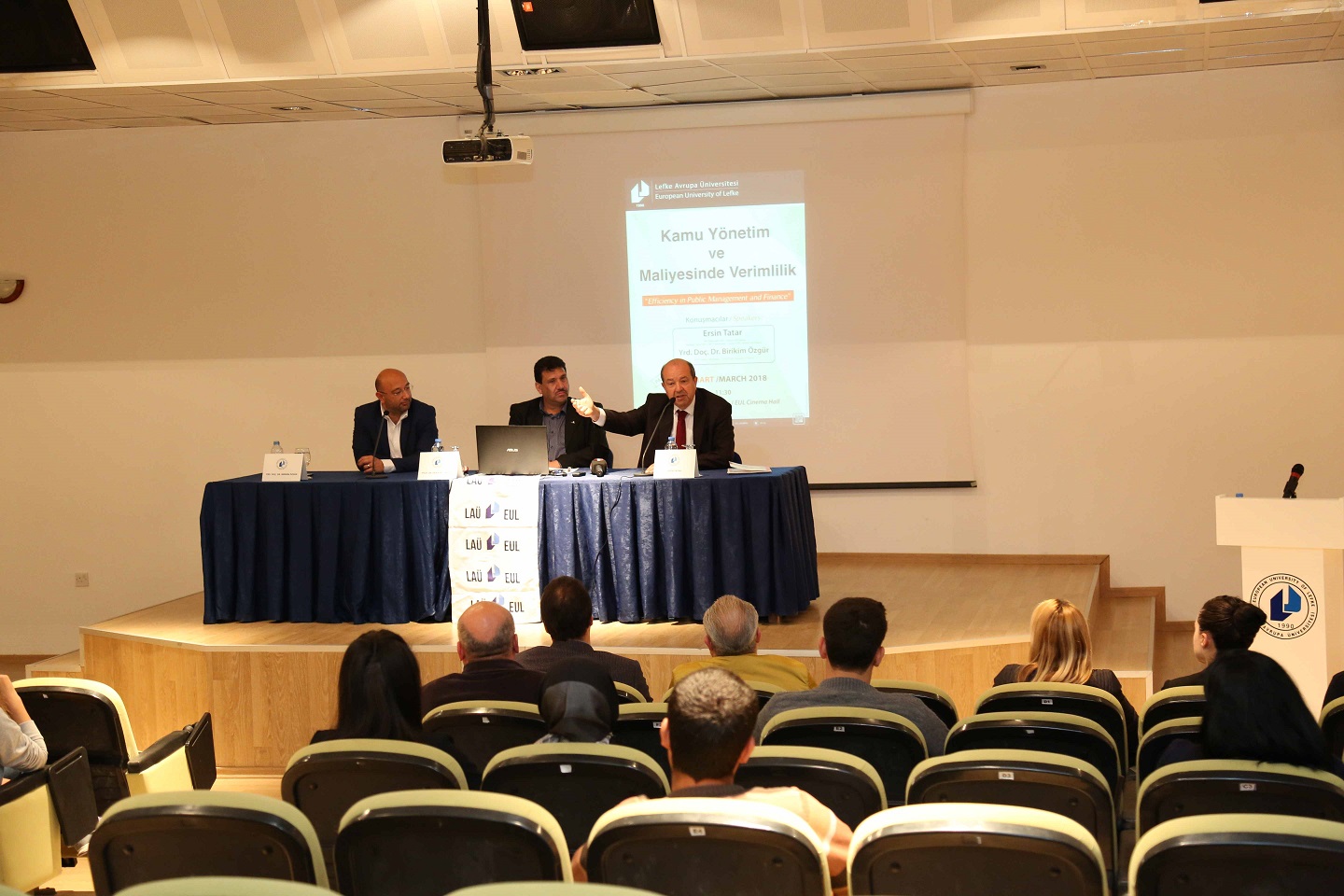Former Ministers of Finance came together with EUL Students

Productivity in Public Finance discussed
UBP Deputy and Former Minister of Finance Ersin Tatar and Former Minister of Finance Birikim Özgür attended “Productivity in Public Administration and Finance” themed panel organized by European University of Lefke (EUL) Faculty of Economics & Administrative Sciences Department of Business as speakers. Dean of Faculty of Economics & Administrative Sciences Prof. Dr. Okan Veli Şafaklı moderated the panel in which the topis of productivity, supervision and accountability in public administration were discussed.
Ersin Tatar: Main point is the effective administration of scarce sources.
Emphasizing that main point of public administration and finance is the effective administration of scarce sources, Tatar gave some examples to this matter and shared his ideas on how to increase productivity. Tatar said that the incident of shutting down the Cyprus Turkish Airlines was a great loss for the country, but added that the government wasn’t able to keep the national airlines alive since annual loss was 100 million TL. He also pointed out that the increase in the number of tourists and students living in the country in recent years has made it necessary to establish a new national airline, but that efficient use of scarce resources should also be provided at this point. Tatar secondly touched upon the supervision of local authorities, and said that, “Money transferred to local governments is approximately 325 million TL per year and this money is a significant amount. Are municipalities and other public institutions really able to evaluate these resources in the best way without making the necessary reforms? This must be supervised actively,” and underlined the importance of Fiscal Management Act. Tatar finally pointed out that using e-government will make the public more efficient and added that the government should not be a competitor of the private sector, but an actor that facilitates the development of the private sector.,
Birikim Özgür: In the new world order, and in the direction of “new public administration” understanding, we must now reform the order
Özgür said that, in 1983 a state was established, after great difficulties and added efforts were being made for an equitable settlement, but that the Turkish Cypriot people need a good state system, if there won’t be a solution and added to achieve this, we must work in cooperation with both the European Union and Turkey. Özgür emphasized that, in particular, until the 2000s, TRNC had failed to produce a model of how to use resources sent by Turkey as a result and added that resources sent by Turkey from the year 2000 has been limited to the needs to build the future of the country by being associated with the concepts of “reform” and “change”. Özgür said that, “In the new world order, and in the direction of “new public administration” understanding, we must now reform the order. We must focus on using our resources in an effective and efficient way. And accordingly, we should create a system in the north that would be one of two politically equal sides, which would not be dependent on the Greek Cypriots, if there would be a solution”. He pointed out that the idea of continuing with same principles of financial protocols signed with Turkey is now cognizable, regardless of the ruling party. Özgür stated that productivity in the whole public sector could start with strategic planning first, and added that unfortunately, ministers that are qualified in this regard are limited. Noting that the tax justice must be provided in order to ensure that the state is effective and efficient in financial terms, Özgür stated that the incentives applied should be evaluated by measuring the benefit they will create. Özgür said that, an average annual budget of 10-11 thousand Turkish liras per student is allocated and that the corresponding private schools provide full-time education at similar costs, but this is not the case in the state. He finally said that, school-based budgeting will provide more efficient use of public resources.
